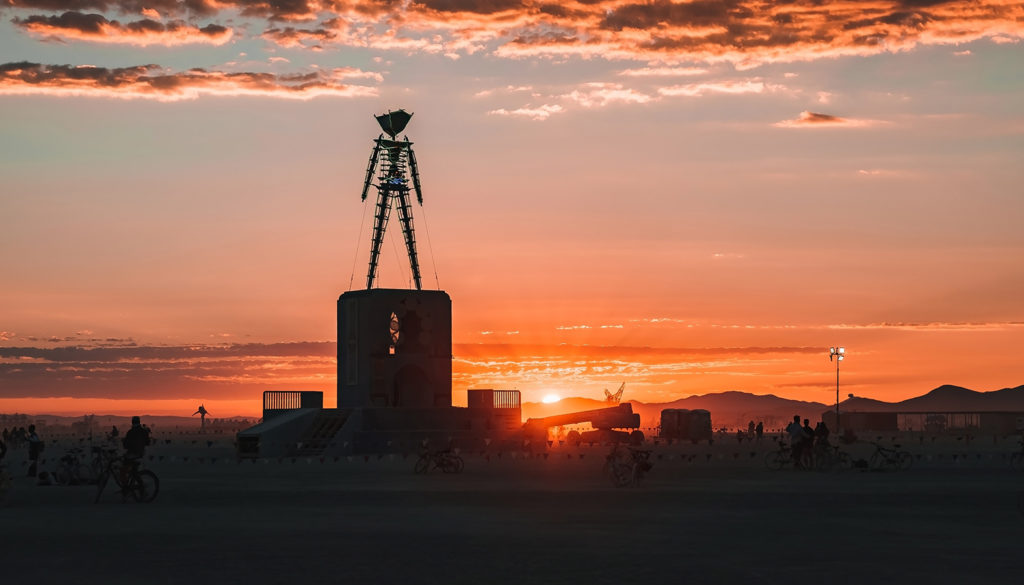One of my all-time favorite media moments involved a press conference held by a group of anarchists during a Los Angeles-hosted presidential convention. It was called in the aftermath of these same anarchists going on a mini-rampage around the convention site.
The anarchists had called the press conference to unveil further plans to disrupt the convention. So, in a packed newsroom with a bouquet of microphones from radio and TV outlets blooming from the podium, the leader of the anarchists approached. Before he could make his opening remarks, reporters exploded questions at him from every direction.
The anarchist waved his hands and asked the reporters to please be orderly.
It appears even anarchists must have some kind of order.
At the end of August through Labor Day weekend, another form of anarchy will take shape in the desert of Nevada. The Burning Man festival has been around for years. This year tens of thousands of people will gather at the Black Rock Desert, about 120 miles north of Reno, Nevada.
It really will be a city that pops up out of nothing, has a flurry of social, artistic, and interpersonal activity, and then vanishes into the hot desert air. It culminates with the actual burning of a wooden effigy.
The burning of effigies is usually a political act ignited by rage. Not so at the Burning Man festival, where it is part of a neopagan celebration of self, nature, the cosmos, and at least 47 manifestations of our popular culture’s favorite buzz word: spirituality.
I could be wrong, but I doubt the spirituality being practiced at Burning Man would easily blend into the kind of spirituality one finds at places like the Sacred Heart Retreat House in Alhambra. I do not think it is an even mild leap to suggest Burning Man attendees, with their crystals, incense, and Baby Boomer “free love” baseline, would see a Catholic retreat as something too rigid, too structured, and not inclusive enough. That is why I found its website such intriguing reading.
As free as they believe themselves to be, they know something that the Church in her wisdom has always known. The universe and ourselves are ordered, and this order must be acknowledged. Without order and standards, things go wonky, like if the double helix strands of our DNA unravel. Knock a gene or two off from the DNA and there is trouble afoot. Jump off a four-story building and the law of gravity will inform you of the injudicious nature of that decision.
This explains why the Burning Man website is dripping with instructions, dos and don’ts, and something called the Ten Principles. The “humanimals” — yes, that is what they call all those who will reside in this instant city of “freedom” — are encouraged to bring their uniqueness, their creativity, and live a life with no holds barred … except those activities that are explicitly forbidden on the official Burning Man website.
It does not sound like paradise to me, but it does have something in common with the Paradise with a capital “P.” There is structure. Adam and Eve had everything, but there was an instruction that they resisted. They thought it would make them free, but it enslaved them.
The Burning Man website brims with confidence that those going to this festival will be free from the constraints of the everyday world. They believe they are free to do as they wish, dress or undress as they wish, and through artistic expression of their own rubrics engage in cosmic oneness.
Is license freedom? Would Lebron James or Patrick Mahomes be “free” if there were no out of bounds or rules to be enforced on a basketball court or football field? If lines of demarcation did not exist, there would just be chaos. Because these rules do exist, these two talents are truly free to express themselves in their unique God-given athleticism.
Even the organizers of Burning Man understand this, as their Ten Principles attest. If those attending this year’s Burning Man are seeking true freedom, I would advise them against putting their “faith” in man-made New Age precepts designed by people who may have attended one more crystal meditation workshop than was good for them.
I would suggest an alternative — something so out of the box it can even be considered radical. Rather than Ten Principles, they could try the Ten Commandments, the Eight Beatitudes and the seven Gifts of the Holy Spirit.

